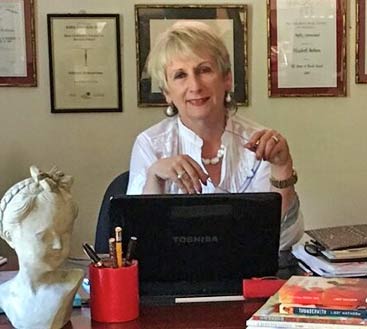 Curly Questions from Kids!
Curly Questions from Kids!
12 Curly Questions for an Author – With thanks to Kids’ Book Review for posing the questions.
I have a penchant for nougat.
Libby. My real name is Elizabeth.
To lose my imagination (or my wallet).
I write in a lyrical and lucid style, I hope! The other eight must be for the reader to judge.
Passionate, curious, poetic, practised, still-learning.
Being Alice from Alice in Wonderland would be quite a hoot because Wonderland would yield up more and more I’m sure, if you could go there at will.
If I were to go back in time I would go back to the eighties when my children were young and do it better than I did the first time round.
This is the stuff that dreams are made of…
Older people in my family (I like the term elders) who read or recited poetry aloud to me. Writers who took me by the hand and still do either by example thus giving permission, (like the works by Calvino or Marquez) and picture books like Rose Blanche by Roberto Innocenti, which gave me permission to write hard texts like Way Home; and sometime face to face discussions.
I read avidly and wanted to write something that would be entertaining to me. My family was a great audience especially for my poems. And then later, I longed for a wider audience so took courage and presented my first story to a publisher…
I don’t have a favourite but I do fall in love with word at certain times and they find a way into my poetry, likes susurrations or threnody. And I like the sound of words with zz in them- fizzy, fuzzy and so on.
A book of Shakespeare’s plays because I discover things every time I read one of them and the deft and imaginative use of language, the deep understanding of human nature is always enthralling to me.
More curly questions
With thanks to St Catherine’s School, Waverley, NSW
It’s usually my latest books in this case my latest picture books are Incredibilia and A Soldier a Dog and a Boy as well as Outside 2014; and my Anzac novel for older readers Eventual Poppy Day. (Harper Collins 2015). But I have a secret affection for Thunderwith my first young adult novel some 27 years in continuous print and a movie (The Echo of Thunder) with Hallmark Hall of Fame.
I work to make my texts poetic and many picture books are in verse, e.g the last three picture books Outside and A Baby for Loving (Little Hare) and A Boy Like Me: A story about peace. (Harper Collins)
The tools of trade of the poet are perfect for this form. Succinctness, rhythm in language, a ‘singing’ repetition and a perfect surprise or satisfactory rounding at the end. Watching my audience from 4 to 40 (and even 400 in India this year) respond to the text and take part in the text by chanting familiar lines, is proof perfect for me that the audience is ‘feeling’ the text. And the writing afterwards shows they are models to children of creative writing itself.
Being exposed to quality texts acts in manifold ways- as sheer enjoyment which is key but it is deeper than that. For picture books it can act as an engaging model of language, it can tempt children to go beyond the text into the world of dreams. And for older readers, more so. To write creatively young writers need to feel free of the constraints of right and wrong and as if they are on a heady path of discovery of themselves.
That my texts leave a certain ‘sweetness’ in the air and a feeling of satisfaction that only good story can bring. That children would like to hear it again and again if they are little ones; that they are interested to explore it further with artwork or craft work; that they use it as a model to invent a text of their own if they are older. If a novel, that they are reluctant to leave the world I’ve painstakingly created as a writer and that they’ve identified with its characters in a meaningful way.
Poetry is the ‘guilty’ party! Poetry! Being read it as a child, writing it as a child, reading poetry for myself when I was older, writing it all my life, is a large part of the reason that I write. In fact I owe a lot to poetry for my creative and my emotional life and at any chance I have with children (especially in workshops or at readings) I show them my love for poetry by reading it, by teasing out the emotion it hatches/ferments/distils in us and by encouraging them to write it. For to me it is the kernel of creativity- metaphorical language- forging fresh new thought- is one of the most powerful satisfactions a creator can have.
Poetry is entwined with the stuff of emotion, of who we are as human beings and children feel this most keenly and can express it well if we are careful not ‘educate’ honest and passionate thought out of them. As an adult, both writing (or thinking it) and reading poetry is part of the fabric of my life so therefore my writer’s routine. Not that I have a strict routine except to say I am a keen reader of novels and poetry and of re-reading favourite poets whose work still makes me wonder…
My life has been dedicated to writing- my first ‘published’ poem for my family was at 5 years old. I was a lucky child who was not only read poetry but was supported in my efforts of writing it. I truly believe that reading and re-reading of favourite family poems from nonsense to high drama, poetry not to be studied or questioned but just for sheer enjoyment is a way of subtly seeding the ground for creative thought.

 When they read my books, sometimes kids email me and ask lists of questions – some of them curly questions! And when I give talks in schools too.
When they read my books, sometimes kids email me and ask lists of questions – some of them curly questions! And when I give talks in schools too.